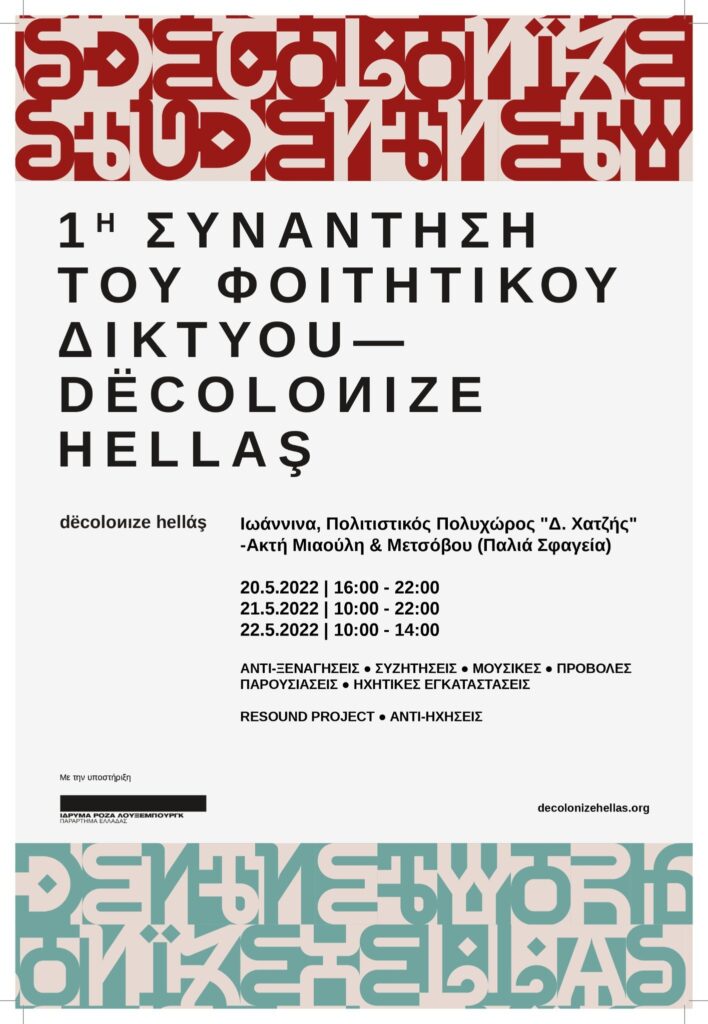
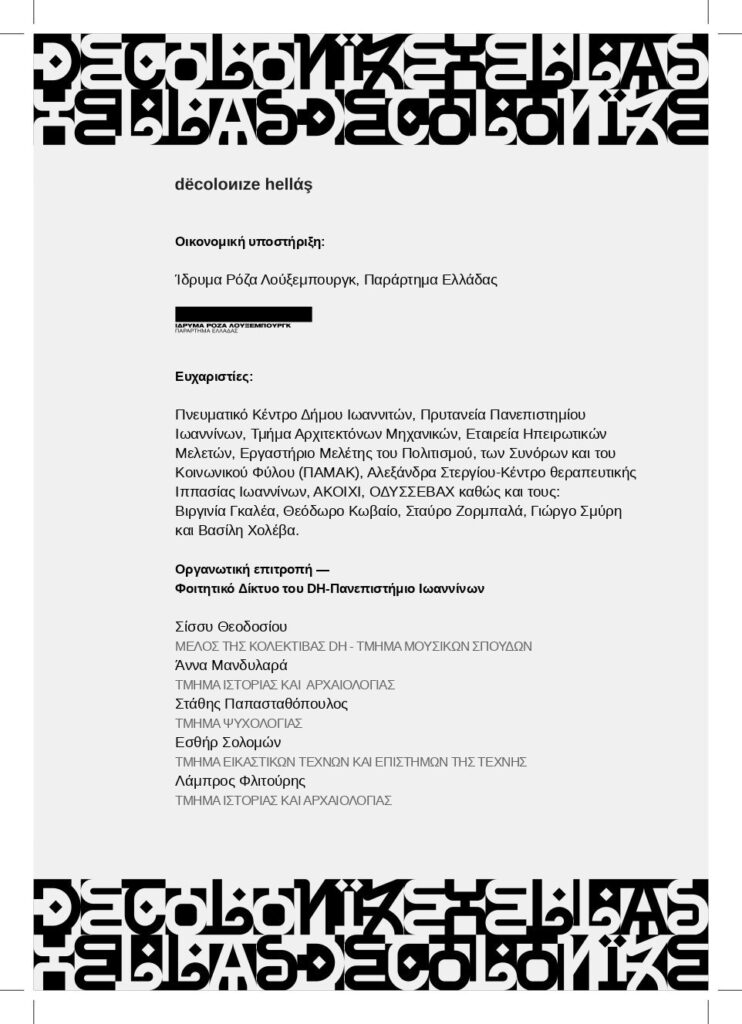
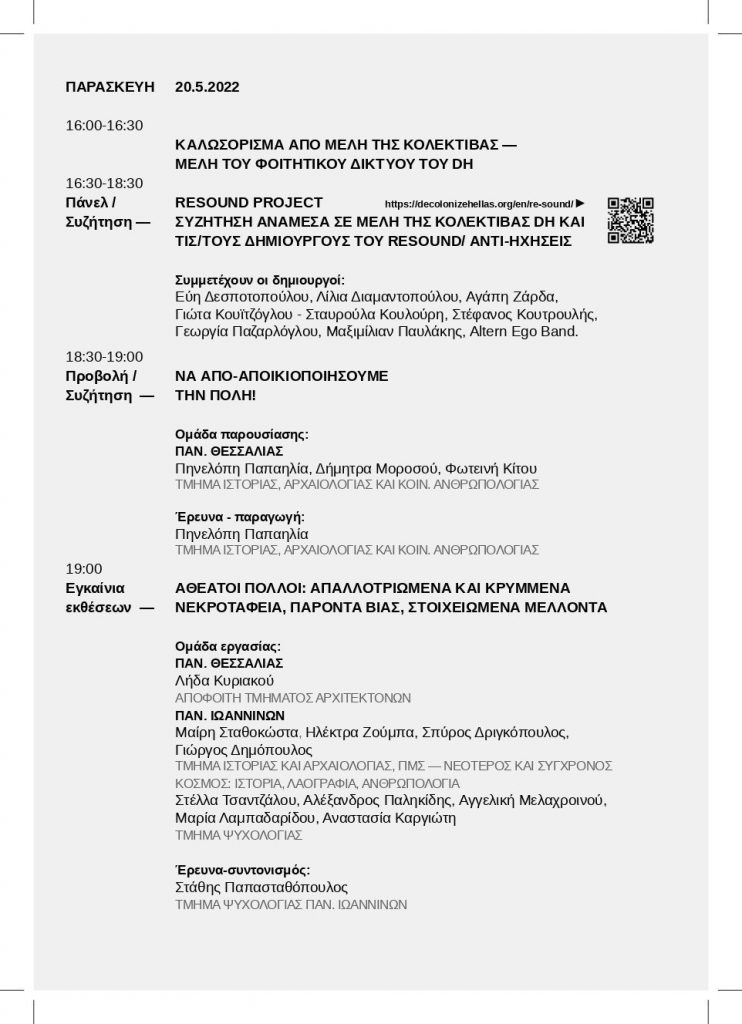
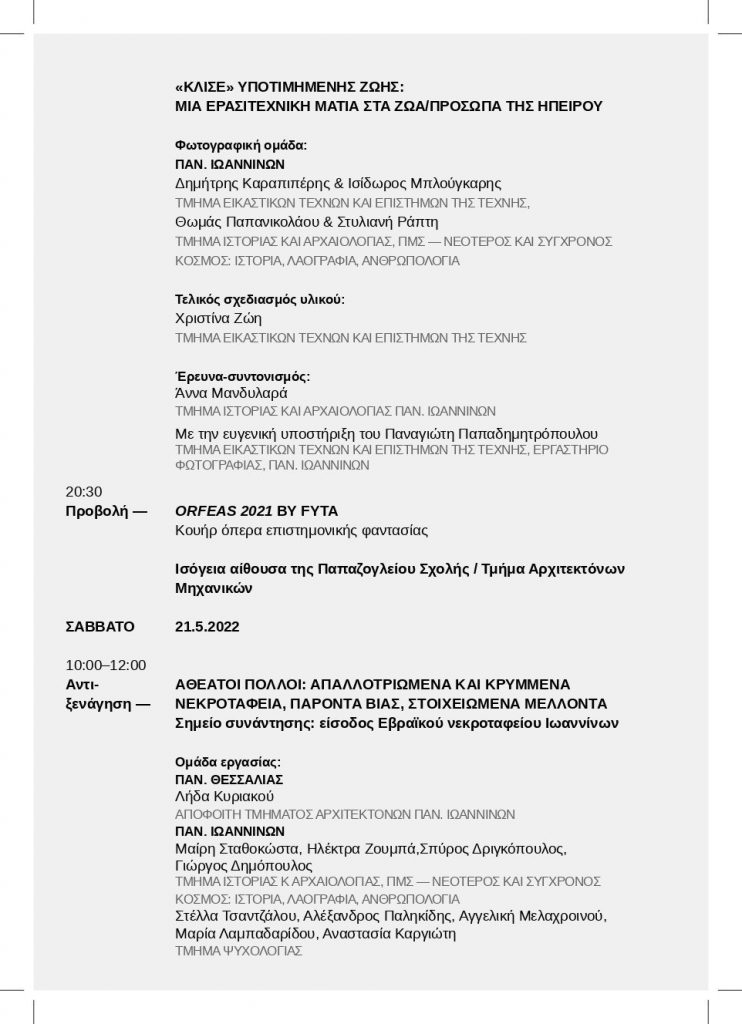
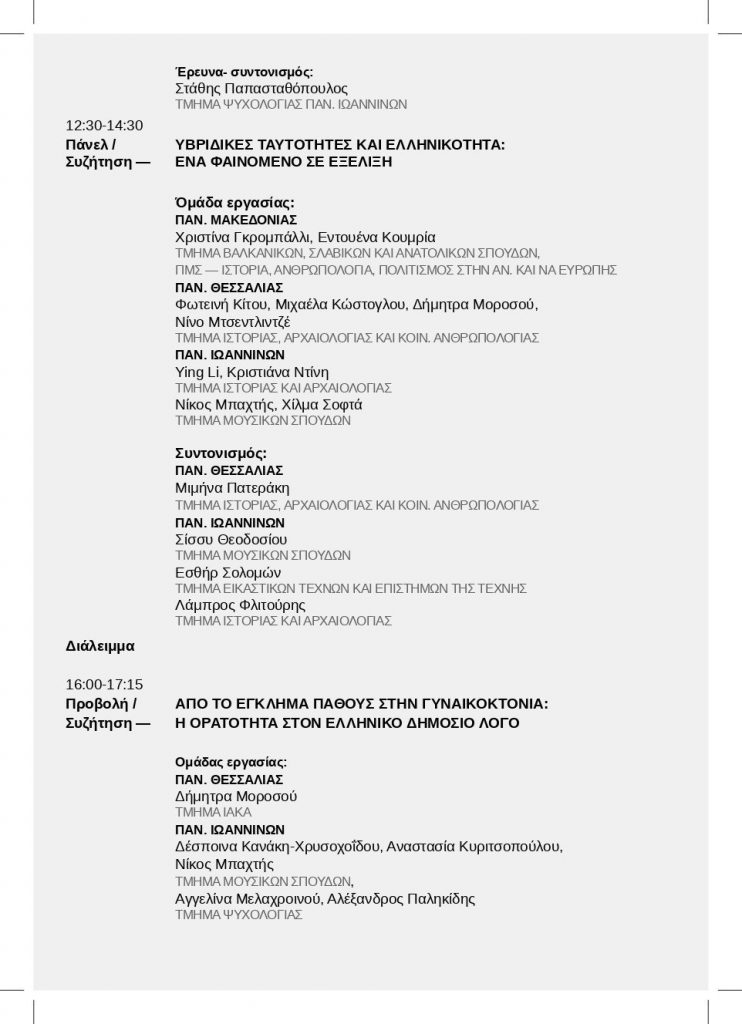

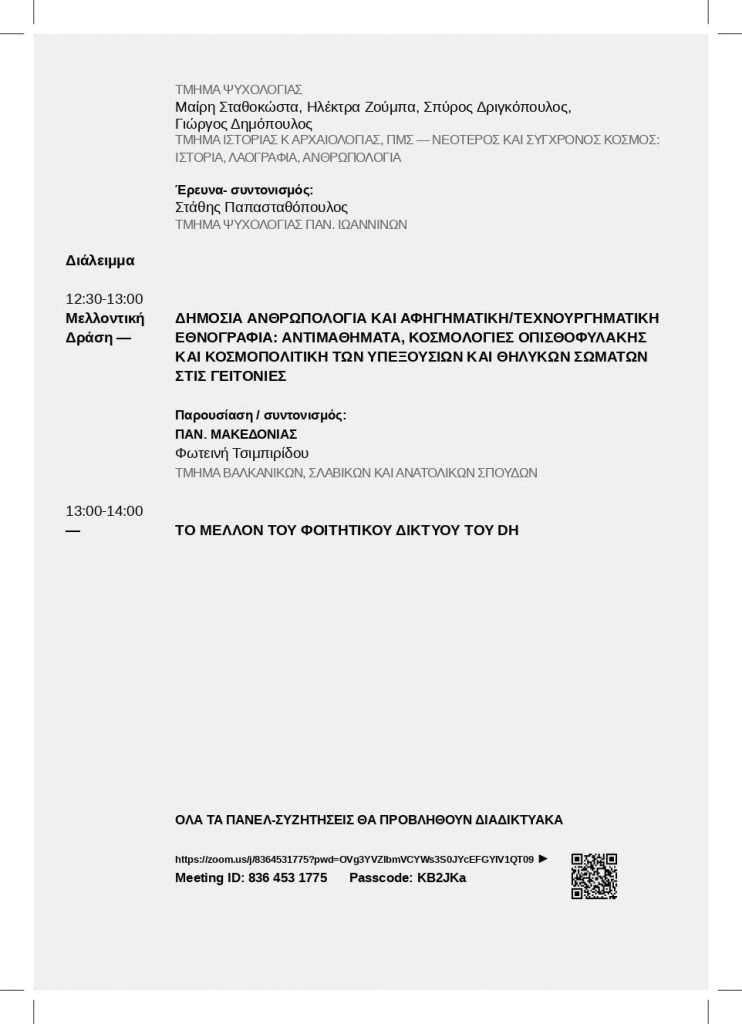
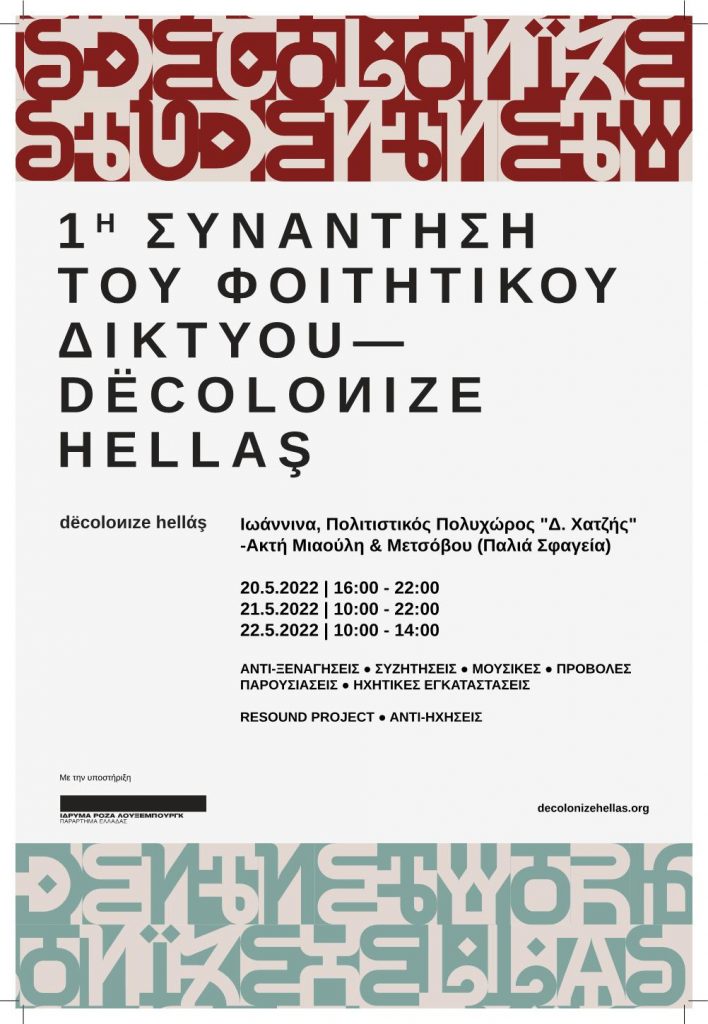
The 1st meeting of the Dëcoloиıze Hellάş student network will make a strong impact in the city and the academic community. The University of Macedonia is one of the 3 member universities of the network!

Mural painting on the walls of an old factory in a suburb of San Sebastián by the Dominican graffiti-artist Eme. Source: https://basquemurals.wordpress.com/tag/feminism/
Date: December 13, 2021
Time: 18:30
Link: https://us02web.zoom.us/j/89460449727?pwd=a2lITDBDUGJta2h3N21aY0RKQndrUT09
The Mizrahi feminism in Israel and the Basque feminism in the Iberian peninsula are setting an interesting comparative context to discuss the minority status and the gender perspective emerging through multiple discriminations and exclusions that shape a palimpsest of patriarchies, based on social inequality, race, language, religion, cultural repression, settler colonialism, national borders, state nationalism and bureaucracy, white male supremacy and structural violence, epistimicide etc. Patriarchy, as a matrix of coloniality, inscribes multiple submissions, consent, subversions and revolts, beyond those inscribed to female bodies, as the first colonized bodies. Following the paths of such minority feminist praxis struggling with specific patriarchal complexities, we could multiply our reflexive and decolonial stance on gender and feminist methodologies, and go beyond the advocacy of identity rights and/or performing activism on stage or within digital spaces.

Mural painting on the walls of an old factory in a suburb of San Sebastián by the Dominican graffiti-artist Eme. Source: https://basquemurals.wordpress.com/tag/feminism/
Date: December 13, 2021
Time: 18:30
Link: https://us02web.zoom.us/j/89460449727?pwd=a2lITDBDUGJta2h3N21aY0RKQndrUT09
The Mizrahi feminism in Israel and the Basque feminism in the Iberian peninsula are setting an interesting comparative context to discuss the minority status and the gender perspective emerging through multiple discriminations and exclusions that shape a palimpsest of patriarchies, based on social inequality, race, language, religion, cultural repression, settler colonialism, national borders, state nationalism and bureaucracy, white male supremacy and structural violence, epistimicide etc. Patriarchy, as a matrix of coloniality, inscribes multiple submissions, consent, subversions and revolts, beyond those inscribed to female bodies, as the first colonized bodies. Following the paths of such minority feminist praxis struggling with specific patriarchal complexities, we could multiply our reflexive and decolonial stance on gender and feminist methodologies, and go beyond the advocacy of identity rights and/or performing activism on stage or within digital spaces.
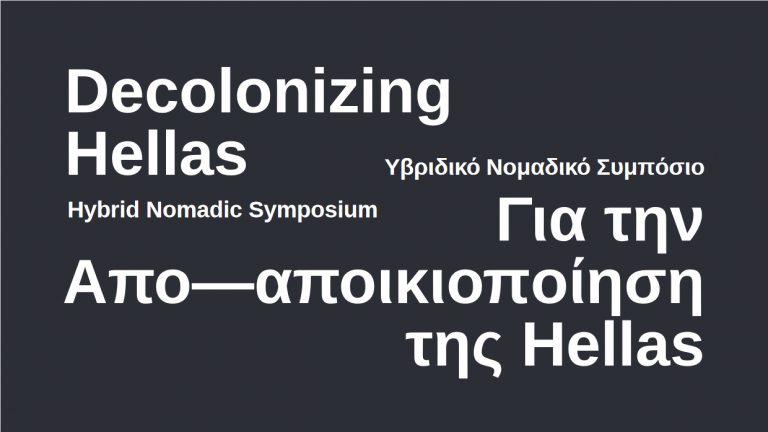
The symposium can be attended both online and in person at the PLYFA Industrial Park, Korytsas 39, in Votanikos, Athens, from November 4 to 7, 2021.
The Culture-Borders-Gender/Lab of the Department of Balkan, Slavic and Oriental Studies, University of Macedonia, is a key supporting entity, with participation from a group of undergraduate and graduate students from our department.
You can find the detailed program of the symposium here: https://decolonizehellas.org/programma/
Notes: – The links for the live stream will be announced in the coming days on the collective’s website www.decolonizehellas.org and on the Facebook page (https://www.facebook.com/decolonizehellas). – Due to COVID-19 pandemic restrictions, the number of attendees at the symposium venue will be limited. Admission will be on a first-come, first-served basis.
You can follow the proceedings of the symposium via the initiative’s YouTube page:
Since 2003, academics and students from various university departments in the Balkans have established the BORDER CROSSINGS Network. The Network encourages the development of university cooperation mainly in the areas of Social and Cultural Anthropology, Folklore, Balkan Studies and History. It aims at promoting closer relationships between Universities, academics and students in the region by regularly organizing various forms of academic exchange.
Such cooperation is an important missing element in the process of cross-cultural and cross-border understanding, inter-ethnic tolerance and economic and political prosperity in the region. The BORDER CROSSINGS network’s activities counter fears, mistrust and prejudices. Students come out of these activities with a better understanding of their common heritage and the benefits, and how to use it to the advantage of the region. In addition, they build capacity within the participating Higher Education Institutions and enable further common research activities.
The Network has, since 2003, institutionalized
– An annual student conference based on round tables with a common agenda where students present their papers in English.
– The annual “Konitsa International Summer School in Anthropology, Ethnography and Comparative Folklore of the Balkans”.
– Three publication series entitled:
1.“Balkan Border Crossings: Proceedings from the Konitsa Summer School”
2.“Balkan Border Crossings: Contributions to Balkan Ethnography”
3.“Balkan Border Crossings: Ethnographic Research in Border Areas“
Website: https://www.border-crossings.eu/
Facebook: https://www.facebook.com/TheBorderCrossingsNetwork/
The Department of Balkan, Slavic and Oriental Studies has been a member of BCN since 2013 and is the co-organizer of:
– the International conferences organized by the network; and
– the Konitsa International Summer School in “Anthropology, Ethnography and
Comparative Folklore of the Balkans”
Website for student conferences: https://www.border-crossings.eu/student-conferences
Website for Konitsa Summer School: https://www.border-crossings.eu/konitsa
Memorandum of cooperation, CREABALK ΝΕΤWORK (2019), between the Department of Balkan, Slavic and Oriental Studies of the University of Macedonia- Culture-Borders-Gender/LAB (cbg-lab.uom.gr), TELEMME – Temps, Espaces, Langages, Europe méridionale Méditerranée, CNRS (https://telemme.mmsh.univ-aix.fr/), University Aix-Marseille και EVS – Environnement, Ville, Société, CNRS (https://www.msh-lse.fr/laboratoires/evs), University Lumière-Lyon2.
The CREABALK ΝΕΤWORK (2019) aims at creating an innovative space for research-creation, experimentation and training/teaching in social sciences, based on the links between 3 research and high education in France and Greece (Thessaloniki, Aix-Marseille, Lyon) and the French Institute in Thessaloniki. Its goal is to promote a genuine positioning, between scientific, artistic and cultural creativity at the regional scale (South Eastern Europe, Mediterranean region), around the notion of “City-Lab” and in order to valuate relationships and innovative practices between research, creation, training/teaching and cultural action. https://cbg-lab.uom.gr/en/creabalk/
“Concrete Utopia- Documentary“
Directed By: Anna Ilin and Josefine Bingemer
Country Of Origin: Germany
Production: Germany
Production Year: 2015
Runtime: 18.16
SYNOPSIS
What defines a city’s identity? In 1963 Skopje was almost completely destroyed by an earthquake, many of its historical buildings were lost forever. Yet, with the help of the international and Yugoslavian community the city succeeded to re-emerge as a kind of modern utopia – modelled after the plan of the Japanese architect Kenzo Tange. Today the great architectural efforts of the 60s and 70s receive little appreciation, though once magnificent giants of concrete, by now many of them are crumbling and suffer from neglect. The situation in Skopje is specifically extreme, as in 2010 the government issued a plan to redesign the city in a kind of neo-renaissance style. In our film we are taking a long and patient look at the architecture of the post-earthquake era and ask people what it means to them.
“Wasingtonia – Animation“
Directed By: Konstantina Kotzamani
Production: Greece
Production Year: 2014
Runtime: 24
Trailer: https://vimeo.com/ondemand/washingtoniashortfilm/84207264
SYNOPSIS
Washingtonia starts when the giraffes heart can no longer be heard.
Washingtonia is an alternative name for Athens, a place where people, like animals, fall into summertime sadness because of the heat. Washingtonia is the only palm tree that its heart is not devoured by the red beetle. Because it’s heart is small and dry and no one likes small and dry heart.
“To tell a ghost- Documentary“
Directed By: Chris Piotrowicz, Stefan Ehrhardt
Country Of Origin: Bosnia and Herzegovina
Production: Bosnia and Herzegovina
Production Year: 2019
Runtime: 11:55
Trailer: https://www.youtube.com/watch?v=iaesaiBybvM
SYNOPSIS
‘To Tell A Ghost’ is a short documentary film directed by Chris Piotrowicz and Stefan Ehrhardt and produced, written and scored by Mirza Ramic. The film tells the story of Mirza Ramic, the Bosnian-born, American-based musician and one half of the electronic music duo Arms and Sleepers. ‘To Tell A Ghost’ captures Mirza’s attempt to process personal loss and childhood memories while finding healing through music.
“Belgrade is Blue like an Orange- Experimental“
Directed By: Antonin Blanc
Country Of Origin: Serbia
Production: Serbia
Production Year: 2018
Runtime: 10:00
Trailer: https://vimeo.com/294759334
SYNOPSIS
A man is driving through Belgrade. There are reminiscences of the soviet past that he despises, and luckily the city will inspire a neo-liberal manifesto.
“Vietnam- Documentary“
Directed By:Jovana Kovanovic
Country Of Origin:Serbia
Production: Serbia
Runtime:26 min
SYNOPSIS
A unique group of youngsters, born in the infamous 90’s in Serbia, have grown up united by certain rules on the streets of isolated Belgrade ghetto, symbolically called Vietnam. At the doorstep of adulthood their friendship is facing temptation, under the weight of new life challenges, needs and social circumstances.
“Spectrum“
Directed By: Dimitris Gkotsis, Greece
Production: Greece
Production Year: 2014
Runtime: 12min
Trailer: https://www.youtube.com/watch?v=VIUkYB434Sg
SYNOPSIS
Spectrum is used to classify something in terms of its position on a scale between two extreme points. Documenting a slice in the life of five different people living in the heart of the city of Athens and the power relations between them. Priorities entwined, leading to misunderstandings and finally the absolute brutality.
“On Bike-Documantary”
Directed By: Gorjan Atanasov
Production: North Macedonia
Production Year: 2015
Runtime: 16
SYNOPSIS
A short documentary about the power and use of the bycicle, the problems of the bicyclists and their fight for space and rights to ride freely in Skopje through Critical Mass and non-violent action.
“Cross“
Directed By: Konstantinos Stathis
Production: Greece
Production Year: 2018
Runtime: 23
Trailer
https://www.imdb.com/title/tt9481694/?ref_=nm_knf_i3
SYNOPSIS
A film is being made, the characters of the film have escaped in the countryside. The director wanders in the city at night. The crew is filming, trying to consist the film from everything that appears to be useful or function-able, but is that so? A woman is wandering in the city at night. The characters start to act for themselves. The crew and the director are getting into the film. Crossing in and out – all these people – ,from that film that’s being made by and with them, among other things.
“4 Days“
Directed by: Michalis Giagkounidis
Production: Greece
Production Year: 2017
Runtime: 79’
Trailer
https://www.imdb.com/title/tt5749812/?ref_=nm_knf_i1
SYNOPSIS
Thessaloniki Greece 2015. A girl in search of excitement tries to combat her wearisome life taking pictures of strangers. A customer at the coffee place she works at asks her to escort him to the hospital. A boy is in love with her. He stalks her. Their lives intersect. 4 days of their interaction scattered in time. Their attempt to change their lives.